Advanced Studies in Industrial Relations: 7 Eleven Case Analysis
VerifiedAdded on 2020/02/24
|11
|3649
|56
Report
AI Summary
This report analyzes the 7-Eleven case within the context of the Australian Employment Relations (ER) system, focusing on an inquiry conducted by the Fair Work Ombudsman. The inquiry revealed systemic non-compliance with workplace laws, including widespread underpayment of wages and manipulation of employment records by 7-Eleven franchisees. The report examines the roles of the state and labor unions, highlighting their shortcomings in addressing employee exploitation and ensuring fair working conditions. The state's failure to act as a protector, income regulator, and rule maker is scrutinized, along with the unions' inadequate efforts in safeguarding employee welfare. The report concludes by emphasizing the implications of the inquiry for the Australian ER system, particularly the need for stronger enforcement of labor laws, improved oversight, and greater protection for vulnerable workers, especially those from non-English speaking backgrounds.

Paraphrase This Document
Need a fresh take? Get an instant paraphrase of this document with our AI Paraphraser
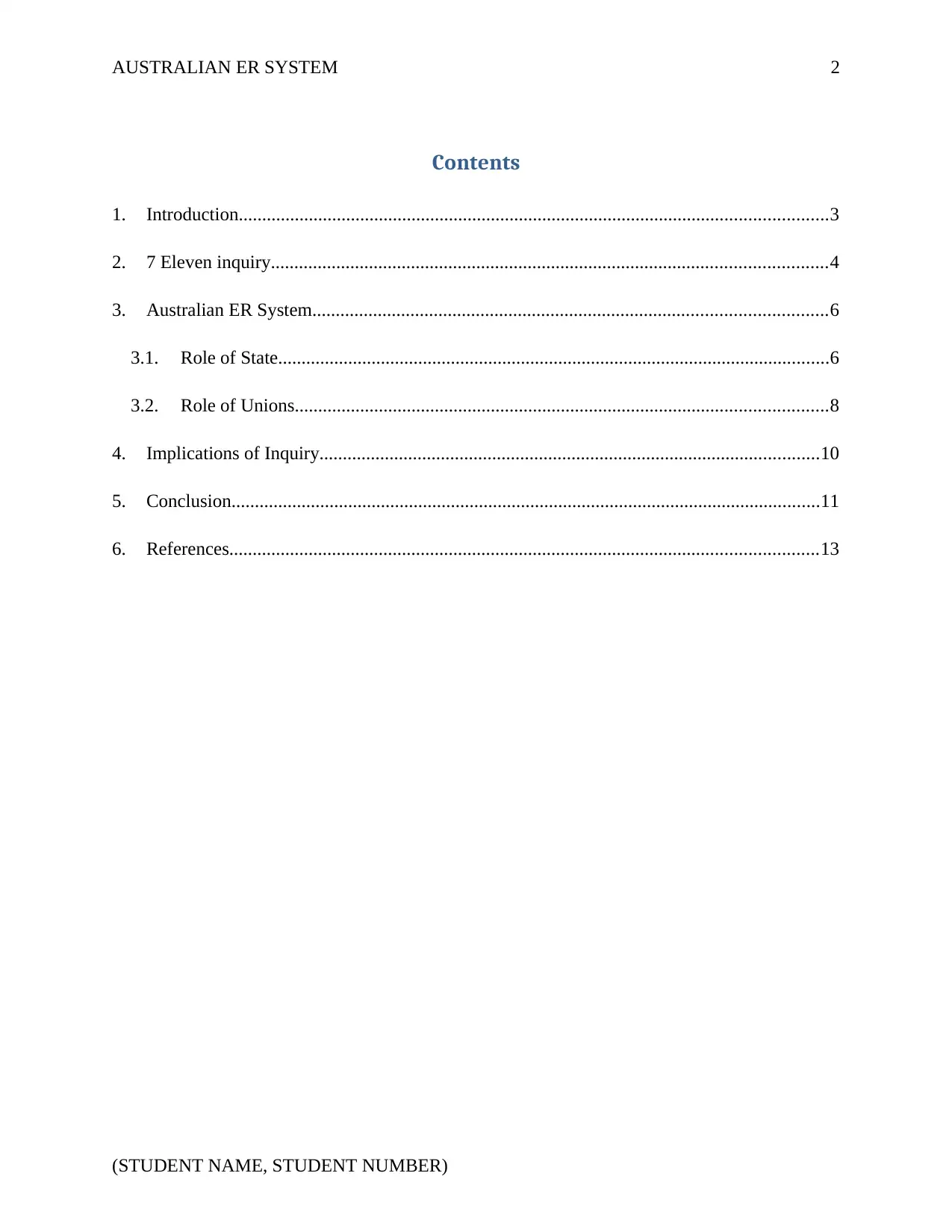
AUSTRALIAN ER SYSTEM 2
Contents
1. Introduction..............................................................................................................................3
2. 7 Eleven inquiry.......................................................................................................................4
3. Australian ER System..............................................................................................................6
3.1. Role of State......................................................................................................................6
3.2. Role of Unions..................................................................................................................8
4. Implications of Inquiry...........................................................................................................10
5. Conclusion..............................................................................................................................11
6. References..............................................................................................................................13
(STUDENT NAME, STUDENT NUMBER)
Contents
1. Introduction..............................................................................................................................3
2. 7 Eleven inquiry.......................................................................................................................4
3. Australian ER System..............................................................................................................6
3.1. Role of State......................................................................................................................6
3.2. Role of Unions..................................................................................................................8
4. Implications of Inquiry...........................................................................................................10
5. Conclusion..............................................................................................................................11
6. References..............................................................................................................................13
(STUDENT NAME, STUDENT NUMBER)
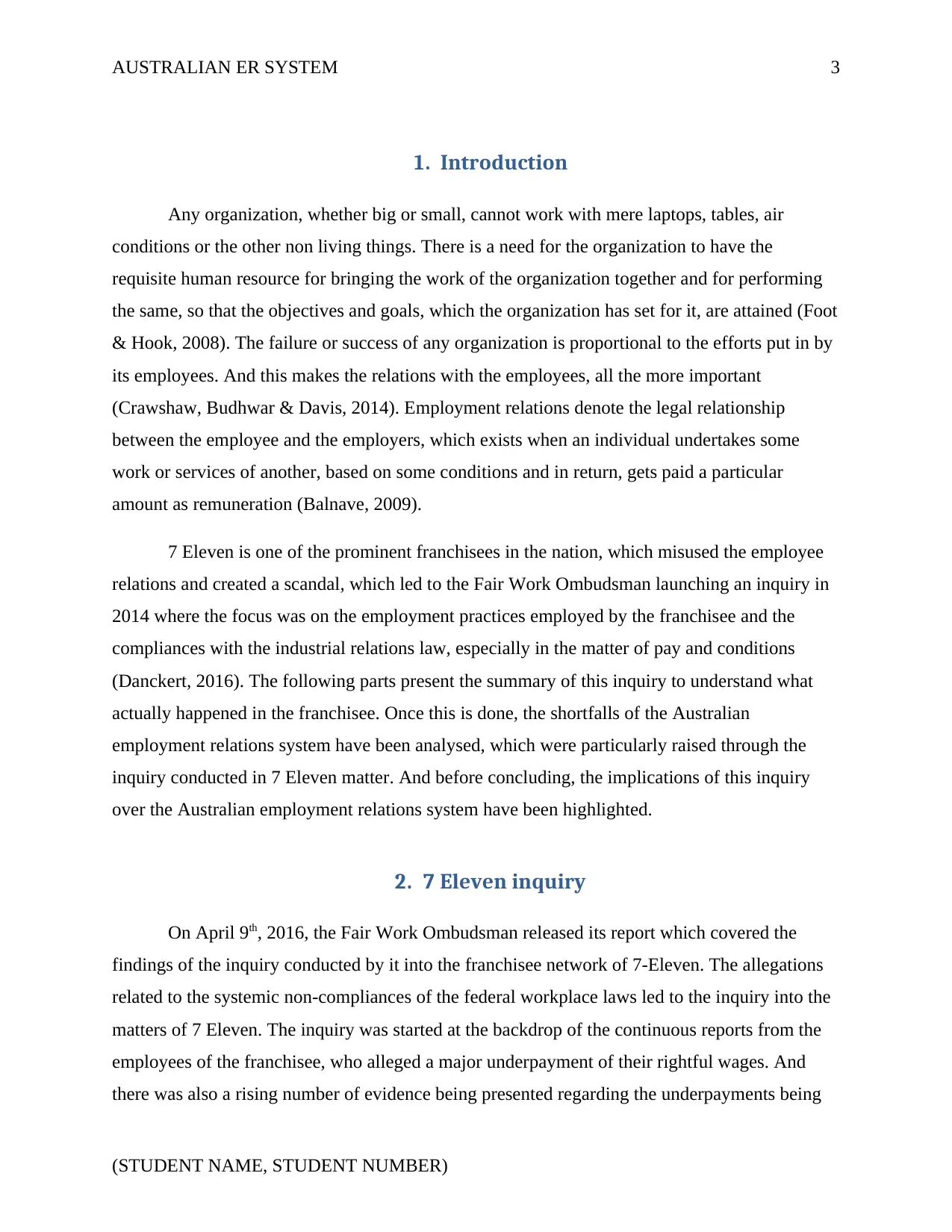
AUSTRALIAN ER SYSTEM 3
1. Introduction
Any organization, whether big or small, cannot work with mere laptops, tables, air
conditions or the other non living things. There is a need for the organization to have the
requisite human resource for bringing the work of the organization together and for performing
the same, so that the objectives and goals, which the organization has set for it, are attained (Foot
& Hook, 2008). The failure or success of any organization is proportional to the efforts put in by
its employees. And this makes the relations with the employees, all the more important
(Crawshaw, Budhwar & Davis, 2014). Employment relations denote the legal relationship
between the employee and the employers, which exists when an individual undertakes some
work or services of another, based on some conditions and in return, gets paid a particular
amount as remuneration (Balnave, 2009).
7 Eleven is one of the prominent franchisees in the nation, which misused the employee
relations and created a scandal, which led to the Fair Work Ombudsman launching an inquiry in
2014 where the focus was on the employment practices employed by the franchisee and the
compliances with the industrial relations law, especially in the matter of pay and conditions
(Danckert, 2016). The following parts present the summary of this inquiry to understand what
actually happened in the franchisee. Once this is done, the shortfalls of the Australian
employment relations system have been analysed, which were particularly raised through the
inquiry conducted in 7 Eleven matter. And before concluding, the implications of this inquiry
over the Australian employment relations system have been highlighted.
2. 7 Eleven inquiry
On April 9th, 2016, the Fair Work Ombudsman released its report which covered the
findings of the inquiry conducted by it into the franchisee network of 7-Eleven. The allegations
related to the systemic non-compliances of the federal workplace laws led to the inquiry into the
matters of 7 Eleven. The inquiry was started at the backdrop of the continuous reports from the
employees of the franchisee, who alleged a major underpayment of their rightful wages. And
there was also a rising number of evidence being presented regarding the underpayments being
(STUDENT NAME, STUDENT NUMBER)
1. Introduction
Any organization, whether big or small, cannot work with mere laptops, tables, air
conditions or the other non living things. There is a need for the organization to have the
requisite human resource for bringing the work of the organization together and for performing
the same, so that the objectives and goals, which the organization has set for it, are attained (Foot
& Hook, 2008). The failure or success of any organization is proportional to the efforts put in by
its employees. And this makes the relations with the employees, all the more important
(Crawshaw, Budhwar & Davis, 2014). Employment relations denote the legal relationship
between the employee and the employers, which exists when an individual undertakes some
work or services of another, based on some conditions and in return, gets paid a particular
amount as remuneration (Balnave, 2009).
7 Eleven is one of the prominent franchisees in the nation, which misused the employee
relations and created a scandal, which led to the Fair Work Ombudsman launching an inquiry in
2014 where the focus was on the employment practices employed by the franchisee and the
compliances with the industrial relations law, especially in the matter of pay and conditions
(Danckert, 2016). The following parts present the summary of this inquiry to understand what
actually happened in the franchisee. Once this is done, the shortfalls of the Australian
employment relations system have been analysed, which were particularly raised through the
inquiry conducted in 7 Eleven matter. And before concluding, the implications of this inquiry
over the Australian employment relations system have been highlighted.
2. 7 Eleven inquiry
On April 9th, 2016, the Fair Work Ombudsman released its report which covered the
findings of the inquiry conducted by it into the franchisee network of 7-Eleven. The allegations
related to the systemic non-compliances of the federal workplace laws led to the inquiry into the
matters of 7 Eleven. The inquiry was started at the backdrop of the continuous reports from the
employees of the franchisee, who alleged a major underpayment of their rightful wages. And
there was also a rising number of evidence being presented regarding the underpayments being
(STUDENT NAME, STUDENT NUMBER)
⊘ This is a preview!⊘
Do you want full access?
Subscribe today to unlock all pages.

Trusted by 1+ million students worldwide
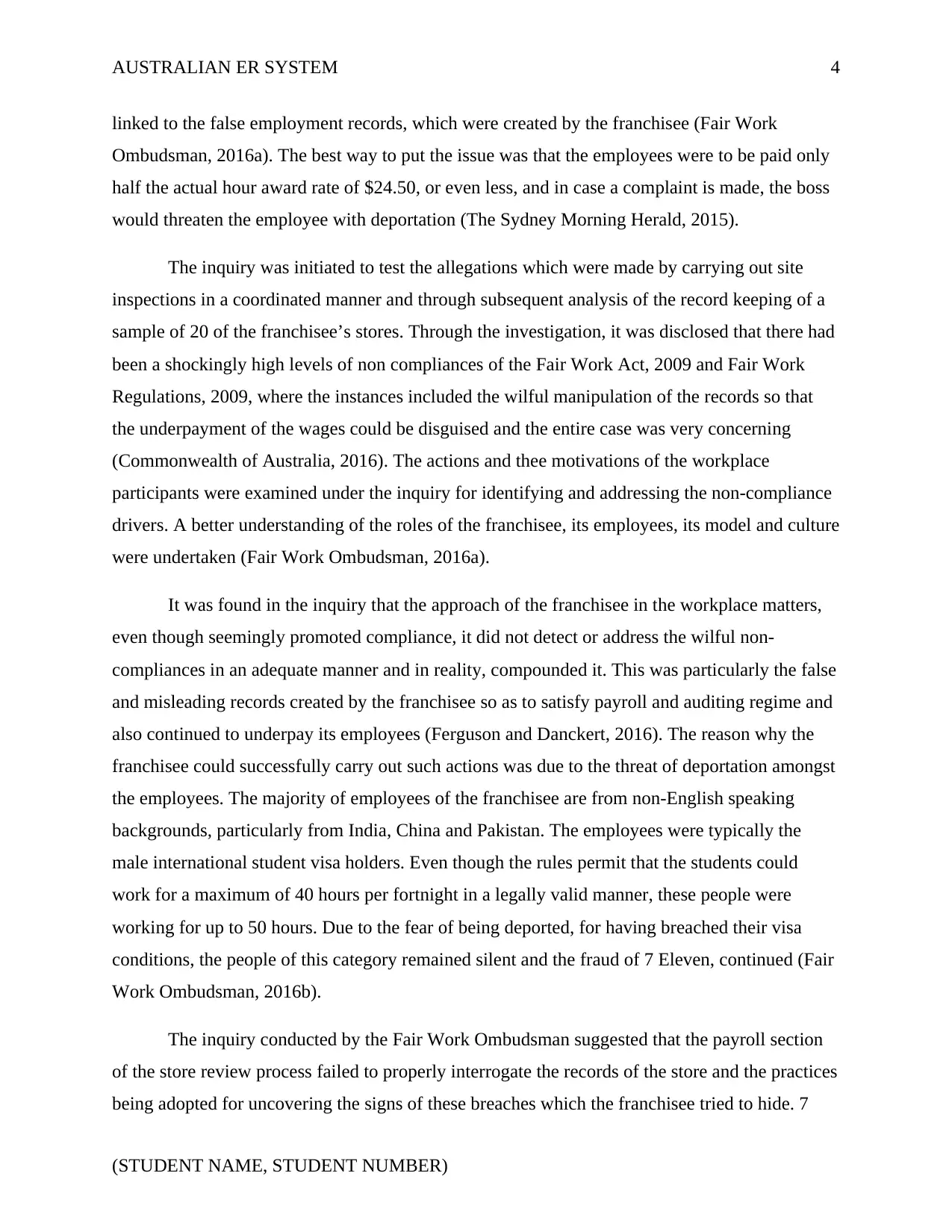
AUSTRALIAN ER SYSTEM 4
linked to the false employment records, which were created by the franchisee (Fair Work
Ombudsman, 2016a). The best way to put the issue was that the employees were to be paid only
half the actual hour award rate of $24.50, or even less, and in case a complaint is made, the boss
would threaten the employee with deportation (The Sydney Morning Herald, 2015).
The inquiry was initiated to test the allegations which were made by carrying out site
inspections in a coordinated manner and through subsequent analysis of the record keeping of a
sample of 20 of the franchisee’s stores. Through the investigation, it was disclosed that there had
been a shockingly high levels of non compliances of the Fair Work Act, 2009 and Fair Work
Regulations, 2009, where the instances included the wilful manipulation of the records so that
the underpayment of the wages could be disguised and the entire case was very concerning
(Commonwealth of Australia, 2016). The actions and thee motivations of the workplace
participants were examined under the inquiry for identifying and addressing the non-compliance
drivers. A better understanding of the roles of the franchisee, its employees, its model and culture
were undertaken (Fair Work Ombudsman, 2016a).
It was found in the inquiry that the approach of the franchisee in the workplace matters,
even though seemingly promoted compliance, it did not detect or address the wilful non-
compliances in an adequate manner and in reality, compounded it. This was particularly the false
and misleading records created by the franchisee so as to satisfy payroll and auditing regime and
also continued to underpay its employees (Ferguson and Danckert, 2016). The reason why the
franchisee could successfully carry out such actions was due to the threat of deportation amongst
the employees. The majority of employees of the franchisee are from non-English speaking
backgrounds, particularly from India, China and Pakistan. The employees were typically the
male international student visa holders. Even though the rules permit that the students could
work for a maximum of 40 hours per fortnight in a legally valid manner, these people were
working for up to 50 hours. Due to the fear of being deported, for having breached their visa
conditions, the people of this category remained silent and the fraud of 7 Eleven, continued (Fair
Work Ombudsman, 2016b).
The inquiry conducted by the Fair Work Ombudsman suggested that the payroll section
of the store review process failed to properly interrogate the records of the store and the practices
being adopted for uncovering the signs of these breaches which the franchisee tried to hide. 7
(STUDENT NAME, STUDENT NUMBER)
linked to the false employment records, which were created by the franchisee (Fair Work
Ombudsman, 2016a). The best way to put the issue was that the employees were to be paid only
half the actual hour award rate of $24.50, or even less, and in case a complaint is made, the boss
would threaten the employee with deportation (The Sydney Morning Herald, 2015).
The inquiry was initiated to test the allegations which were made by carrying out site
inspections in a coordinated manner and through subsequent analysis of the record keeping of a
sample of 20 of the franchisee’s stores. Through the investigation, it was disclosed that there had
been a shockingly high levels of non compliances of the Fair Work Act, 2009 and Fair Work
Regulations, 2009, where the instances included the wilful manipulation of the records so that
the underpayment of the wages could be disguised and the entire case was very concerning
(Commonwealth of Australia, 2016). The actions and thee motivations of the workplace
participants were examined under the inquiry for identifying and addressing the non-compliance
drivers. A better understanding of the roles of the franchisee, its employees, its model and culture
were undertaken (Fair Work Ombudsman, 2016a).
It was found in the inquiry that the approach of the franchisee in the workplace matters,
even though seemingly promoted compliance, it did not detect or address the wilful non-
compliances in an adequate manner and in reality, compounded it. This was particularly the false
and misleading records created by the franchisee so as to satisfy payroll and auditing regime and
also continued to underpay its employees (Ferguson and Danckert, 2016). The reason why the
franchisee could successfully carry out such actions was due to the threat of deportation amongst
the employees. The majority of employees of the franchisee are from non-English speaking
backgrounds, particularly from India, China and Pakistan. The employees were typically the
male international student visa holders. Even though the rules permit that the students could
work for a maximum of 40 hours per fortnight in a legally valid manner, these people were
working for up to 50 hours. Due to the fear of being deported, for having breached their visa
conditions, the people of this category remained silent and the fraud of 7 Eleven, continued (Fair
Work Ombudsman, 2016b).
The inquiry conducted by the Fair Work Ombudsman suggested that the payroll section
of the store review process failed to properly interrogate the records of the store and the practices
being adopted for uncovering the signs of these breaches which the franchisee tried to hide. 7
(STUDENT NAME, STUDENT NUMBER)
Paraphrase This Document
Need a fresh take? Get an instant paraphrase of this document with our AI Paraphraser
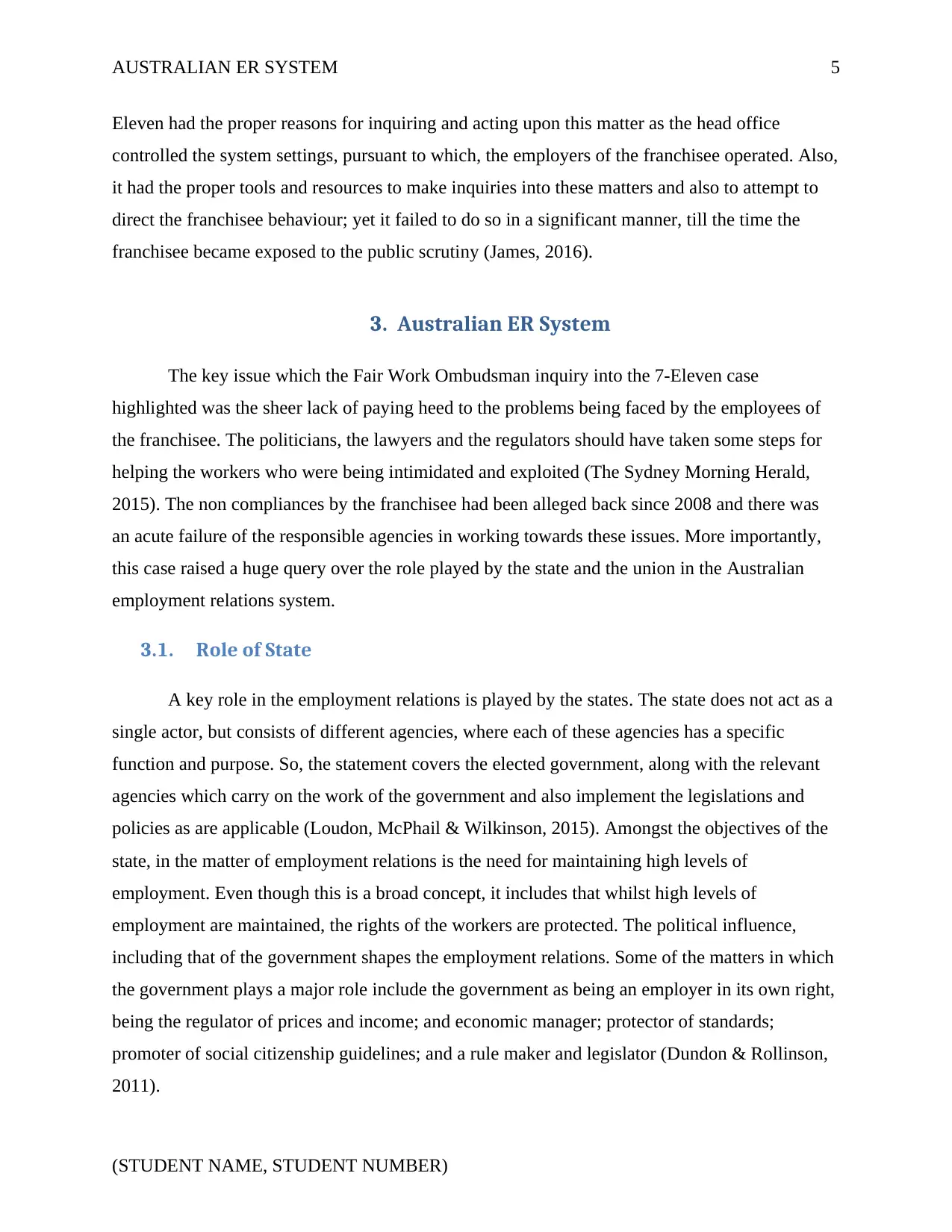
AUSTRALIAN ER SYSTEM 5
Eleven had the proper reasons for inquiring and acting upon this matter as the head office
controlled the system settings, pursuant to which, the employers of the franchisee operated. Also,
it had the proper tools and resources to make inquiries into these matters and also to attempt to
direct the franchisee behaviour; yet it failed to do so in a significant manner, till the time the
franchisee became exposed to the public scrutiny (James, 2016).
3. Australian ER System
The key issue which the Fair Work Ombudsman inquiry into the 7-Eleven case
highlighted was the sheer lack of paying heed to the problems being faced by the employees of
the franchisee. The politicians, the lawyers and the regulators should have taken some steps for
helping the workers who were being intimidated and exploited (The Sydney Morning Herald,
2015). The non compliances by the franchisee had been alleged back since 2008 and there was
an acute failure of the responsible agencies in working towards these issues. More importantly,
this case raised a huge query over the role played by the state and the union in the Australian
employment relations system.
3.1. Role of State
A key role in the employment relations is played by the states. The state does not act as a
single actor, but consists of different agencies, where each of these agencies has a specific
function and purpose. So, the statement covers the elected government, along with the relevant
agencies which carry on the work of the government and also implement the legislations and
policies as are applicable (Loudon, McPhail & Wilkinson, 2015). Amongst the objectives of the
state, in the matter of employment relations is the need for maintaining high levels of
employment. Even though this is a broad concept, it includes that whilst high levels of
employment are maintained, the rights of the workers are protected. The political influence,
including that of the government shapes the employment relations. Some of the matters in which
the government plays a major role include the government as being an employer in its own right,
being the regulator of prices and income; and economic manager; protector of standards;
promoter of social citizenship guidelines; and a rule maker and legislator (Dundon & Rollinson,
2011).
(STUDENT NAME, STUDENT NUMBER)
Eleven had the proper reasons for inquiring and acting upon this matter as the head office
controlled the system settings, pursuant to which, the employers of the franchisee operated. Also,
it had the proper tools and resources to make inquiries into these matters and also to attempt to
direct the franchisee behaviour; yet it failed to do so in a significant manner, till the time the
franchisee became exposed to the public scrutiny (James, 2016).
3. Australian ER System
The key issue which the Fair Work Ombudsman inquiry into the 7-Eleven case
highlighted was the sheer lack of paying heed to the problems being faced by the employees of
the franchisee. The politicians, the lawyers and the regulators should have taken some steps for
helping the workers who were being intimidated and exploited (The Sydney Morning Herald,
2015). The non compliances by the franchisee had been alleged back since 2008 and there was
an acute failure of the responsible agencies in working towards these issues. More importantly,
this case raised a huge query over the role played by the state and the union in the Australian
employment relations system.
3.1. Role of State
A key role in the employment relations is played by the states. The state does not act as a
single actor, but consists of different agencies, where each of these agencies has a specific
function and purpose. So, the statement covers the elected government, along with the relevant
agencies which carry on the work of the government and also implement the legislations and
policies as are applicable (Loudon, McPhail & Wilkinson, 2015). Amongst the objectives of the
state, in the matter of employment relations is the need for maintaining high levels of
employment. Even though this is a broad concept, it includes that whilst high levels of
employment are maintained, the rights of the workers are protected. The political influence,
including that of the government shapes the employment relations. Some of the matters in which
the government plays a major role include the government as being an employer in its own right,
being the regulator of prices and income; and economic manager; protector of standards;
promoter of social citizenship guidelines; and a rule maker and legislator (Dundon & Rollinson,
2011).
(STUDENT NAME, STUDENT NUMBER)
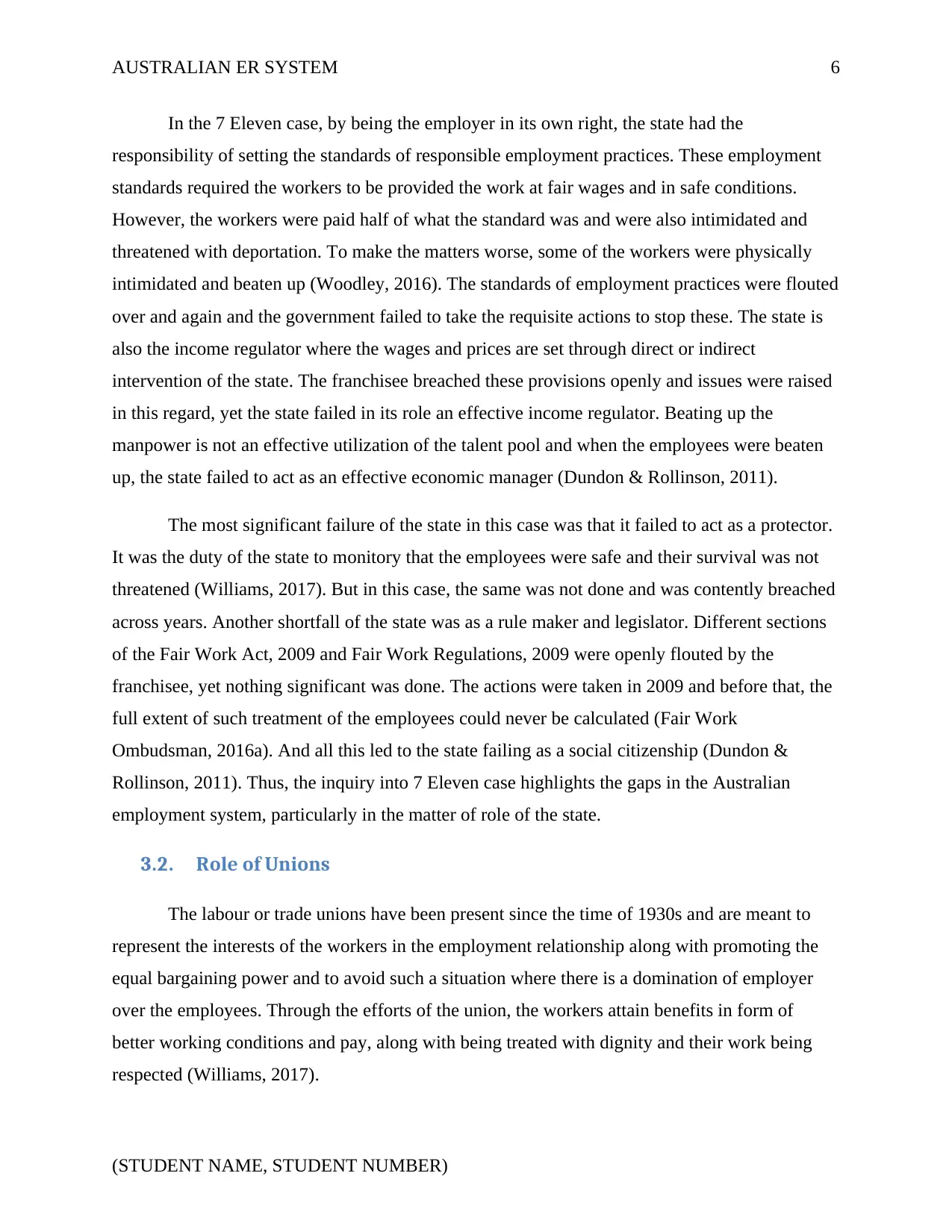
AUSTRALIAN ER SYSTEM 6
In the 7 Eleven case, by being the employer in its own right, the state had the
responsibility of setting the standards of responsible employment practices. These employment
standards required the workers to be provided the work at fair wages and in safe conditions.
However, the workers were paid half of what the standard was and were also intimidated and
threatened with deportation. To make the matters worse, some of the workers were physically
intimidated and beaten up (Woodley, 2016). The standards of employment practices were flouted
over and again and the government failed to take the requisite actions to stop these. The state is
also the income regulator where the wages and prices are set through direct or indirect
intervention of the state. The franchisee breached these provisions openly and issues were raised
in this regard, yet the state failed in its role an effective income regulator. Beating up the
manpower is not an effective utilization of the talent pool and when the employees were beaten
up, the state failed to act as an effective economic manager (Dundon & Rollinson, 2011).
The most significant failure of the state in this case was that it failed to act as a protector.
It was the duty of the state to monitory that the employees were safe and their survival was not
threatened (Williams, 2017). But in this case, the same was not done and was contently breached
across years. Another shortfall of the state was as a rule maker and legislator. Different sections
of the Fair Work Act, 2009 and Fair Work Regulations, 2009 were openly flouted by the
franchisee, yet nothing significant was done. The actions were taken in 2009 and before that, the
full extent of such treatment of the employees could never be calculated (Fair Work
Ombudsman, 2016a). And all this led to the state failing as a social citizenship (Dundon &
Rollinson, 2011). Thus, the inquiry into 7 Eleven case highlights the gaps in the Australian
employment system, particularly in the matter of role of the state.
3.2. Role of Unions
The labour or trade unions have been present since the time of 1930s and are meant to
represent the interests of the workers in the employment relationship along with promoting the
equal bargaining power and to avoid such a situation where there is a domination of employer
over the employees. Through the efforts of the union, the workers attain benefits in form of
better working conditions and pay, along with being treated with dignity and their work being
respected (Williams, 2017).
(STUDENT NAME, STUDENT NUMBER)
In the 7 Eleven case, by being the employer in its own right, the state had the
responsibility of setting the standards of responsible employment practices. These employment
standards required the workers to be provided the work at fair wages and in safe conditions.
However, the workers were paid half of what the standard was and were also intimidated and
threatened with deportation. To make the matters worse, some of the workers were physically
intimidated and beaten up (Woodley, 2016). The standards of employment practices were flouted
over and again and the government failed to take the requisite actions to stop these. The state is
also the income regulator where the wages and prices are set through direct or indirect
intervention of the state. The franchisee breached these provisions openly and issues were raised
in this regard, yet the state failed in its role an effective income regulator. Beating up the
manpower is not an effective utilization of the talent pool and when the employees were beaten
up, the state failed to act as an effective economic manager (Dundon & Rollinson, 2011).
The most significant failure of the state in this case was that it failed to act as a protector.
It was the duty of the state to monitory that the employees were safe and their survival was not
threatened (Williams, 2017). But in this case, the same was not done and was contently breached
across years. Another shortfall of the state was as a rule maker and legislator. Different sections
of the Fair Work Act, 2009 and Fair Work Regulations, 2009 were openly flouted by the
franchisee, yet nothing significant was done. The actions were taken in 2009 and before that, the
full extent of such treatment of the employees could never be calculated (Fair Work
Ombudsman, 2016a). And all this led to the state failing as a social citizenship (Dundon &
Rollinson, 2011). Thus, the inquiry into 7 Eleven case highlights the gaps in the Australian
employment system, particularly in the matter of role of the state.
3.2. Role of Unions
The labour or trade unions have been present since the time of 1930s and are meant to
represent the interests of the workers in the employment relationship along with promoting the
equal bargaining power and to avoid such a situation where there is a domination of employer
over the employees. Through the efforts of the union, the workers attain benefits in form of
better working conditions and pay, along with being treated with dignity and their work being
respected (Williams, 2017).
(STUDENT NAME, STUDENT NUMBER)
⊘ This is a preview!⊘
Do you want full access?
Subscribe today to unlock all pages.

Trusted by 1+ million students worldwide
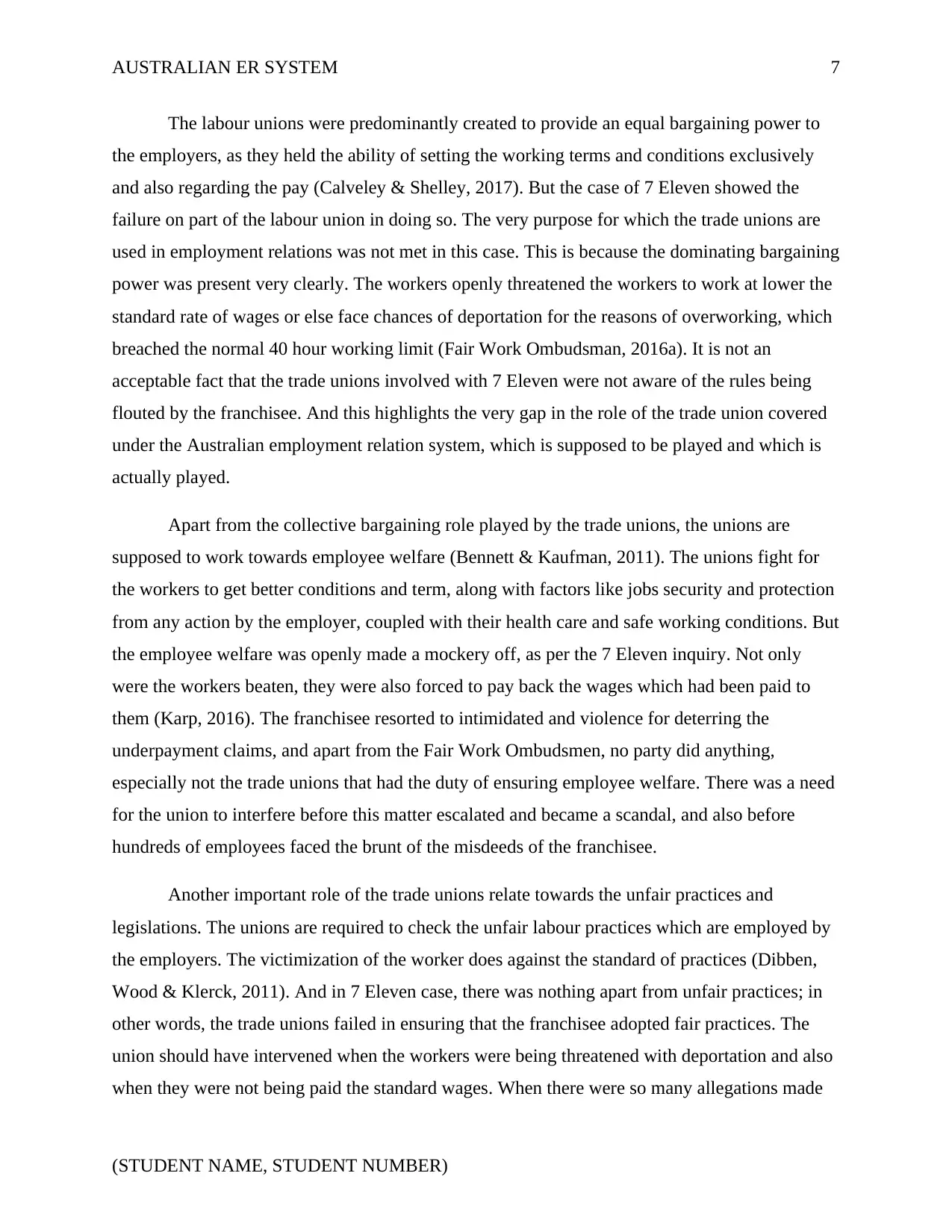
AUSTRALIAN ER SYSTEM 7
The labour unions were predominantly created to provide an equal bargaining power to
the employers, as they held the ability of setting the working terms and conditions exclusively
and also regarding the pay (Calveley & Shelley, 2017). But the case of 7 Eleven showed the
failure on part of the labour union in doing so. The very purpose for which the trade unions are
used in employment relations was not met in this case. This is because the dominating bargaining
power was present very clearly. The workers openly threatened the workers to work at lower the
standard rate of wages or else face chances of deportation for the reasons of overworking, which
breached the normal 40 hour working limit (Fair Work Ombudsman, 2016a). It is not an
acceptable fact that the trade unions involved with 7 Eleven were not aware of the rules being
flouted by the franchisee. And this highlights the very gap in the role of the trade union covered
under the Australian employment relation system, which is supposed to be played and which is
actually played.
Apart from the collective bargaining role played by the trade unions, the unions are
supposed to work towards employee welfare (Bennett & Kaufman, 2011). The unions fight for
the workers to get better conditions and term, along with factors like jobs security and protection
from any action by the employer, coupled with their health care and safe working conditions. But
the employee welfare was openly made a mockery off, as per the 7 Eleven inquiry. Not only
were the workers beaten, they were also forced to pay back the wages which had been paid to
them (Karp, 2016). The franchisee resorted to intimidated and violence for deterring the
underpayment claims, and apart from the Fair Work Ombudsmen, no party did anything,
especially not the trade unions that had the duty of ensuring employee welfare. There was a need
for the union to interfere before this matter escalated and became a scandal, and also before
hundreds of employees faced the brunt of the misdeeds of the franchisee.
Another important role of the trade unions relate towards the unfair practices and
legislations. The unions are required to check the unfair labour practices which are employed by
the employers. The victimization of the worker does against the standard of practices (Dibben,
Wood & Klerck, 2011). And in 7 Eleven case, there was nothing apart from unfair practices; in
other words, the trade unions failed in ensuring that the franchisee adopted fair practices. The
union should have intervened when the workers were being threatened with deportation and also
when they were not being paid the standard wages. When there were so many allegations made
(STUDENT NAME, STUDENT NUMBER)
The labour unions were predominantly created to provide an equal bargaining power to
the employers, as they held the ability of setting the working terms and conditions exclusively
and also regarding the pay (Calveley & Shelley, 2017). But the case of 7 Eleven showed the
failure on part of the labour union in doing so. The very purpose for which the trade unions are
used in employment relations was not met in this case. This is because the dominating bargaining
power was present very clearly. The workers openly threatened the workers to work at lower the
standard rate of wages or else face chances of deportation for the reasons of overworking, which
breached the normal 40 hour working limit (Fair Work Ombudsman, 2016a). It is not an
acceptable fact that the trade unions involved with 7 Eleven were not aware of the rules being
flouted by the franchisee. And this highlights the very gap in the role of the trade union covered
under the Australian employment relation system, which is supposed to be played and which is
actually played.
Apart from the collective bargaining role played by the trade unions, the unions are
supposed to work towards employee welfare (Bennett & Kaufman, 2011). The unions fight for
the workers to get better conditions and term, along with factors like jobs security and protection
from any action by the employer, coupled with their health care and safe working conditions. But
the employee welfare was openly made a mockery off, as per the 7 Eleven inquiry. Not only
were the workers beaten, they were also forced to pay back the wages which had been paid to
them (Karp, 2016). The franchisee resorted to intimidated and violence for deterring the
underpayment claims, and apart from the Fair Work Ombudsmen, no party did anything,
especially not the trade unions that had the duty of ensuring employee welfare. There was a need
for the union to interfere before this matter escalated and became a scandal, and also before
hundreds of employees faced the brunt of the misdeeds of the franchisee.
Another important role of the trade unions relate towards the unfair practices and
legislations. The unions are required to check the unfair labour practices which are employed by
the employers. The victimization of the worker does against the standard of practices (Dibben,
Wood & Klerck, 2011). And in 7 Eleven case, there was nothing apart from unfair practices; in
other words, the trade unions failed in ensuring that the franchisee adopted fair practices. The
union should have intervened when the workers were being threatened with deportation and also
when they were not being paid the standard wages. When there were so many allegations made
(STUDENT NAME, STUDENT NUMBER)
Paraphrase This Document
Need a fresh take? Get an instant paraphrase of this document with our AI Paraphraser
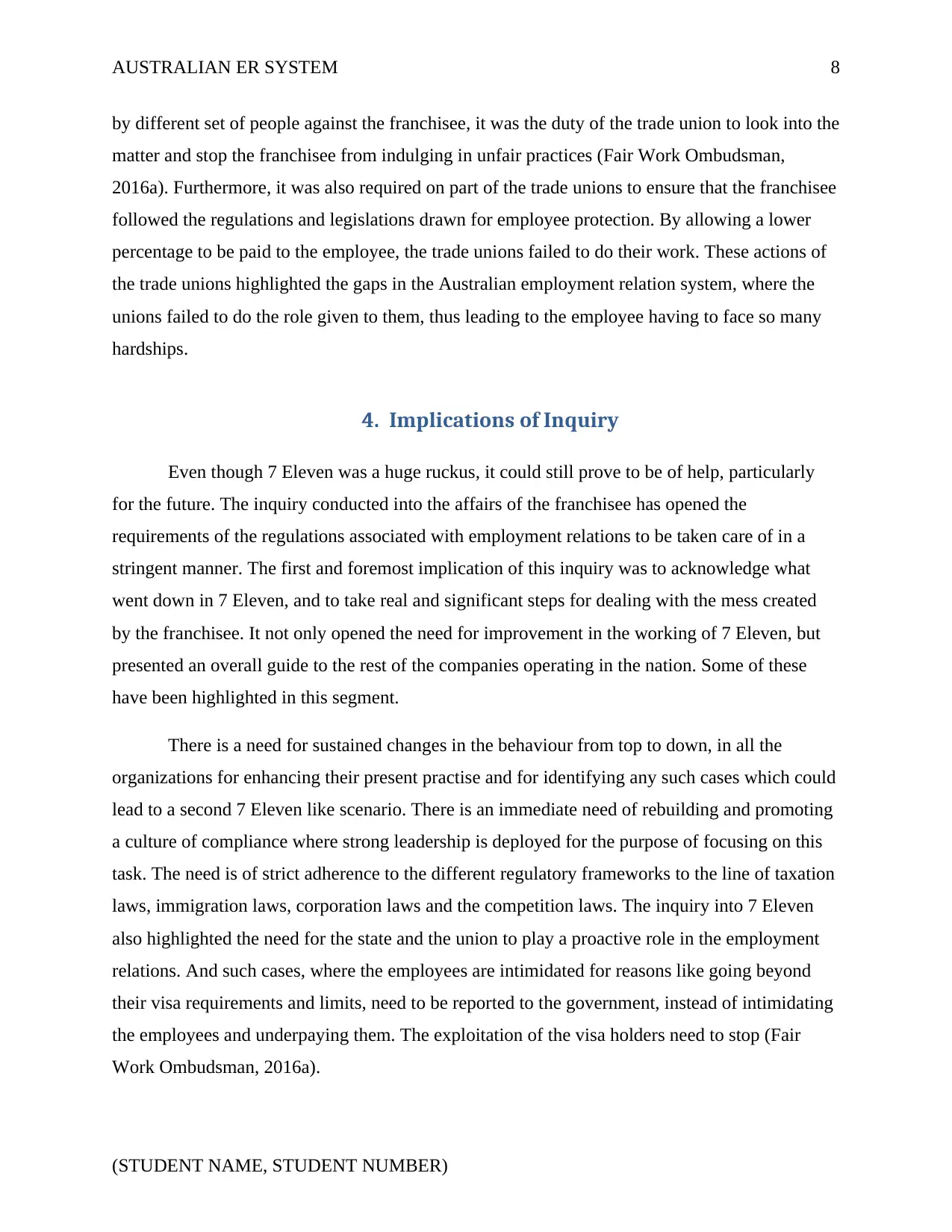
AUSTRALIAN ER SYSTEM 8
by different set of people against the franchisee, it was the duty of the trade union to look into the
matter and stop the franchisee from indulging in unfair practices (Fair Work Ombudsman,
2016a). Furthermore, it was also required on part of the trade unions to ensure that the franchisee
followed the regulations and legislations drawn for employee protection. By allowing a lower
percentage to be paid to the employee, the trade unions failed to do their work. These actions of
the trade unions highlighted the gaps in the Australian employment relation system, where the
unions failed to do the role given to them, thus leading to the employee having to face so many
hardships.
4. Implications of Inquiry
Even though 7 Eleven was a huge ruckus, it could still prove to be of help, particularly
for the future. The inquiry conducted into the affairs of the franchisee has opened the
requirements of the regulations associated with employment relations to be taken care of in a
stringent manner. The first and foremost implication of this inquiry was to acknowledge what
went down in 7 Eleven, and to take real and significant steps for dealing with the mess created
by the franchisee. It not only opened the need for improvement in the working of 7 Eleven, but
presented an overall guide to the rest of the companies operating in the nation. Some of these
have been highlighted in this segment.
There is a need for sustained changes in the behaviour from top to down, in all the
organizations for enhancing their present practise and for identifying any such cases which could
lead to a second 7 Eleven like scenario. There is an immediate need of rebuilding and promoting
a culture of compliance where strong leadership is deployed for the purpose of focusing on this
task. The need is of strict adherence to the different regulatory frameworks to the line of taxation
laws, immigration laws, corporation laws and the competition laws. The inquiry into 7 Eleven
also highlighted the need for the state and the union to play a proactive role in the employment
relations. And such cases, where the employees are intimidated for reasons like going beyond
their visa requirements and limits, need to be reported to the government, instead of intimidating
the employees and underpaying them. The exploitation of the visa holders need to stop (Fair
Work Ombudsman, 2016a).
(STUDENT NAME, STUDENT NUMBER)
by different set of people against the franchisee, it was the duty of the trade union to look into the
matter and stop the franchisee from indulging in unfair practices (Fair Work Ombudsman,
2016a). Furthermore, it was also required on part of the trade unions to ensure that the franchisee
followed the regulations and legislations drawn for employee protection. By allowing a lower
percentage to be paid to the employee, the trade unions failed to do their work. These actions of
the trade unions highlighted the gaps in the Australian employment relation system, where the
unions failed to do the role given to them, thus leading to the employee having to face so many
hardships.
4. Implications of Inquiry
Even though 7 Eleven was a huge ruckus, it could still prove to be of help, particularly
for the future. The inquiry conducted into the affairs of the franchisee has opened the
requirements of the regulations associated with employment relations to be taken care of in a
stringent manner. The first and foremost implication of this inquiry was to acknowledge what
went down in 7 Eleven, and to take real and significant steps for dealing with the mess created
by the franchisee. It not only opened the need for improvement in the working of 7 Eleven, but
presented an overall guide to the rest of the companies operating in the nation. Some of these
have been highlighted in this segment.
There is a need for sustained changes in the behaviour from top to down, in all the
organizations for enhancing their present practise and for identifying any such cases which could
lead to a second 7 Eleven like scenario. There is an immediate need of rebuilding and promoting
a culture of compliance where strong leadership is deployed for the purpose of focusing on this
task. The need is of strict adherence to the different regulatory frameworks to the line of taxation
laws, immigration laws, corporation laws and the competition laws. The inquiry into 7 Eleven
also highlighted the need for the state and the union to play a proactive role in the employment
relations. And such cases, where the employees are intimidated for reasons like going beyond
their visa requirements and limits, need to be reported to the government, instead of intimidating
the employees and underpaying them. The exploitation of the visa holders need to stop (Fair
Work Ombudsman, 2016a).
(STUDENT NAME, STUDENT NUMBER)
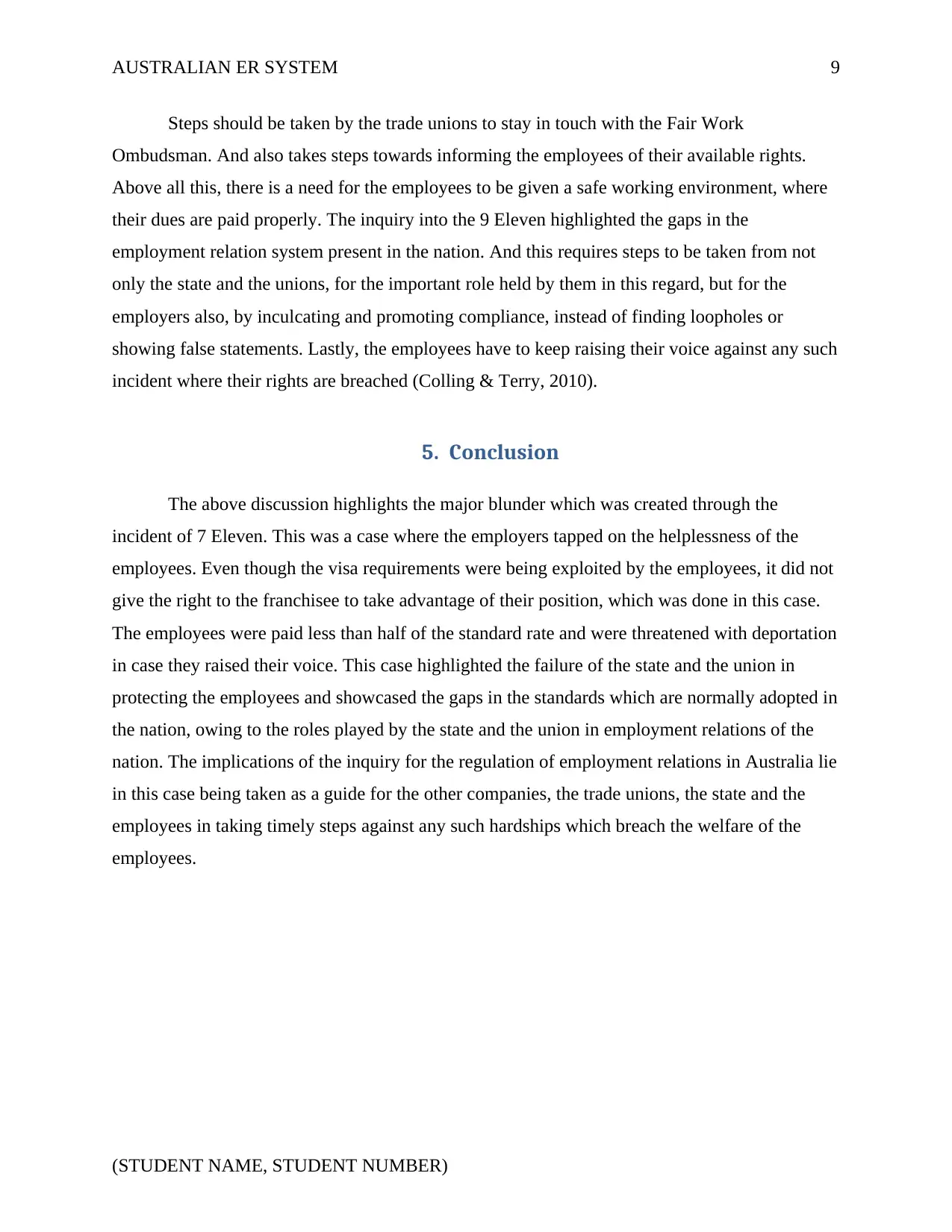
AUSTRALIAN ER SYSTEM 9
Steps should be taken by the trade unions to stay in touch with the Fair Work
Ombudsman. And also takes steps towards informing the employees of their available rights.
Above all this, there is a need for the employees to be given a safe working environment, where
their dues are paid properly. The inquiry into the 9 Eleven highlighted the gaps in the
employment relation system present in the nation. And this requires steps to be taken from not
only the state and the unions, for the important role held by them in this regard, but for the
employers also, by inculcating and promoting compliance, instead of finding loopholes or
showing false statements. Lastly, the employees have to keep raising their voice against any such
incident where their rights are breached (Colling & Terry, 2010).
5. Conclusion
The above discussion highlights the major blunder which was created through the
incident of 7 Eleven. This was a case where the employers tapped on the helplessness of the
employees. Even though the visa requirements were being exploited by the employees, it did not
give the right to the franchisee to take advantage of their position, which was done in this case.
The employees were paid less than half of the standard rate and were threatened with deportation
in case they raised their voice. This case highlighted the failure of the state and the union in
protecting the employees and showcased the gaps in the standards which are normally adopted in
the nation, owing to the roles played by the state and the union in employment relations of the
nation. The implications of the inquiry for the regulation of employment relations in Australia lie
in this case being taken as a guide for the other companies, the trade unions, the state and the
employees in taking timely steps against any such hardships which breach the welfare of the
employees.
(STUDENT NAME, STUDENT NUMBER)
Steps should be taken by the trade unions to stay in touch with the Fair Work
Ombudsman. And also takes steps towards informing the employees of their available rights.
Above all this, there is a need for the employees to be given a safe working environment, where
their dues are paid properly. The inquiry into the 9 Eleven highlighted the gaps in the
employment relation system present in the nation. And this requires steps to be taken from not
only the state and the unions, for the important role held by them in this regard, but for the
employers also, by inculcating and promoting compliance, instead of finding loopholes or
showing false statements. Lastly, the employees have to keep raising their voice against any such
incident where their rights are breached (Colling & Terry, 2010).
5. Conclusion
The above discussion highlights the major blunder which was created through the
incident of 7 Eleven. This was a case where the employers tapped on the helplessness of the
employees. Even though the visa requirements were being exploited by the employees, it did not
give the right to the franchisee to take advantage of their position, which was done in this case.
The employees were paid less than half of the standard rate and were threatened with deportation
in case they raised their voice. This case highlighted the failure of the state and the union in
protecting the employees and showcased the gaps in the standards which are normally adopted in
the nation, owing to the roles played by the state and the union in employment relations of the
nation. The implications of the inquiry for the regulation of employment relations in Australia lie
in this case being taken as a guide for the other companies, the trade unions, the state and the
employees in taking timely steps against any such hardships which breach the welfare of the
employees.
(STUDENT NAME, STUDENT NUMBER)
⊘ This is a preview!⊘
Do you want full access?
Subscribe today to unlock all pages.

Trusted by 1+ million students worldwide
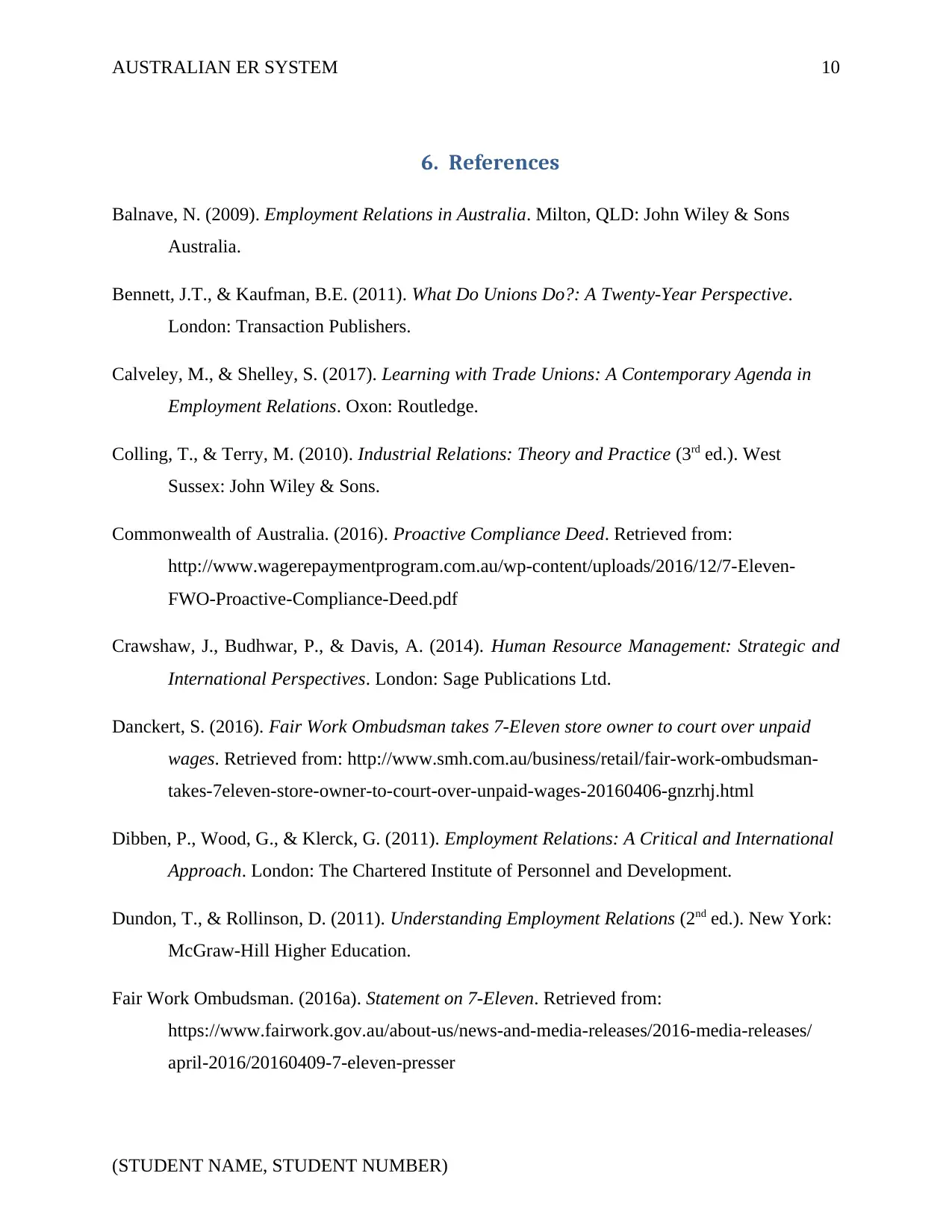
AUSTRALIAN ER SYSTEM 10
6. References
Balnave, N. (2009). Employment Relations in Australia. Milton, QLD: John Wiley & Sons
Australia.
Bennett, J.T., & Kaufman, B.E. (2011). What Do Unions Do?: A Twenty-Year Perspective.
London: Transaction Publishers.
Calveley, M., & Shelley, S. (2017). Learning with Trade Unions: A Contemporary Agenda in
Employment Relations. Oxon: Routledge.
Colling, T., & Terry, M. (2010). Industrial Relations: Theory and Practice (3rd ed.). West
Sussex: John Wiley & Sons.
Commonwealth of Australia. (2016). Proactive Compliance Deed. Retrieved from:
http://www.wagerepaymentprogram.com.au/wp-content/uploads/2016/12/7-Eleven-
FWO-Proactive-Compliance-Deed.pdf
Crawshaw, J., Budhwar, P., & Davis, A. (2014). Human Resource Management: Strategic and
International Perspectives. London: Sage Publications Ltd.
Danckert, S. (2016). Fair Work Ombudsman takes 7-Eleven store owner to court over unpaid
wages. Retrieved from: http://www.smh.com.au/business/retail/fair-work-ombudsman-
takes-7eleven-store-owner-to-court-over-unpaid-wages-20160406-gnzrhj.html
Dibben, P., Wood, G., & Klerck, G. (2011). Employment Relations: A Critical and International
Approach. London: The Chartered Institute of Personnel and Development.
Dundon, T., & Rollinson, D. (2011). Understanding Employment Relations (2nd ed.). New York:
McGraw-Hill Higher Education.
Fair Work Ombudsman. (2016a). Statement on 7-Eleven. Retrieved from:
https://www.fairwork.gov.au/about-us/news-and-media-releases/2016-media-releases/
april-2016/20160409-7-eleven-presser
(STUDENT NAME, STUDENT NUMBER)
6. References
Balnave, N. (2009). Employment Relations in Australia. Milton, QLD: John Wiley & Sons
Australia.
Bennett, J.T., & Kaufman, B.E. (2011). What Do Unions Do?: A Twenty-Year Perspective.
London: Transaction Publishers.
Calveley, M., & Shelley, S. (2017). Learning with Trade Unions: A Contemporary Agenda in
Employment Relations. Oxon: Routledge.
Colling, T., & Terry, M. (2010). Industrial Relations: Theory and Practice (3rd ed.). West
Sussex: John Wiley & Sons.
Commonwealth of Australia. (2016). Proactive Compliance Deed. Retrieved from:
http://www.wagerepaymentprogram.com.au/wp-content/uploads/2016/12/7-Eleven-
FWO-Proactive-Compliance-Deed.pdf
Crawshaw, J., Budhwar, P., & Davis, A. (2014). Human Resource Management: Strategic and
International Perspectives. London: Sage Publications Ltd.
Danckert, S. (2016). Fair Work Ombudsman takes 7-Eleven store owner to court over unpaid
wages. Retrieved from: http://www.smh.com.au/business/retail/fair-work-ombudsman-
takes-7eleven-store-owner-to-court-over-unpaid-wages-20160406-gnzrhj.html
Dibben, P., Wood, G., & Klerck, G. (2011). Employment Relations: A Critical and International
Approach. London: The Chartered Institute of Personnel and Development.
Dundon, T., & Rollinson, D. (2011). Understanding Employment Relations (2nd ed.). New York:
McGraw-Hill Higher Education.
Fair Work Ombudsman. (2016a). Statement on 7-Eleven. Retrieved from:
https://www.fairwork.gov.au/about-us/news-and-media-releases/2016-media-releases/
april-2016/20160409-7-eleven-presser
(STUDENT NAME, STUDENT NUMBER)
Paraphrase This Document
Need a fresh take? Get an instant paraphrase of this document with our AI Paraphraser
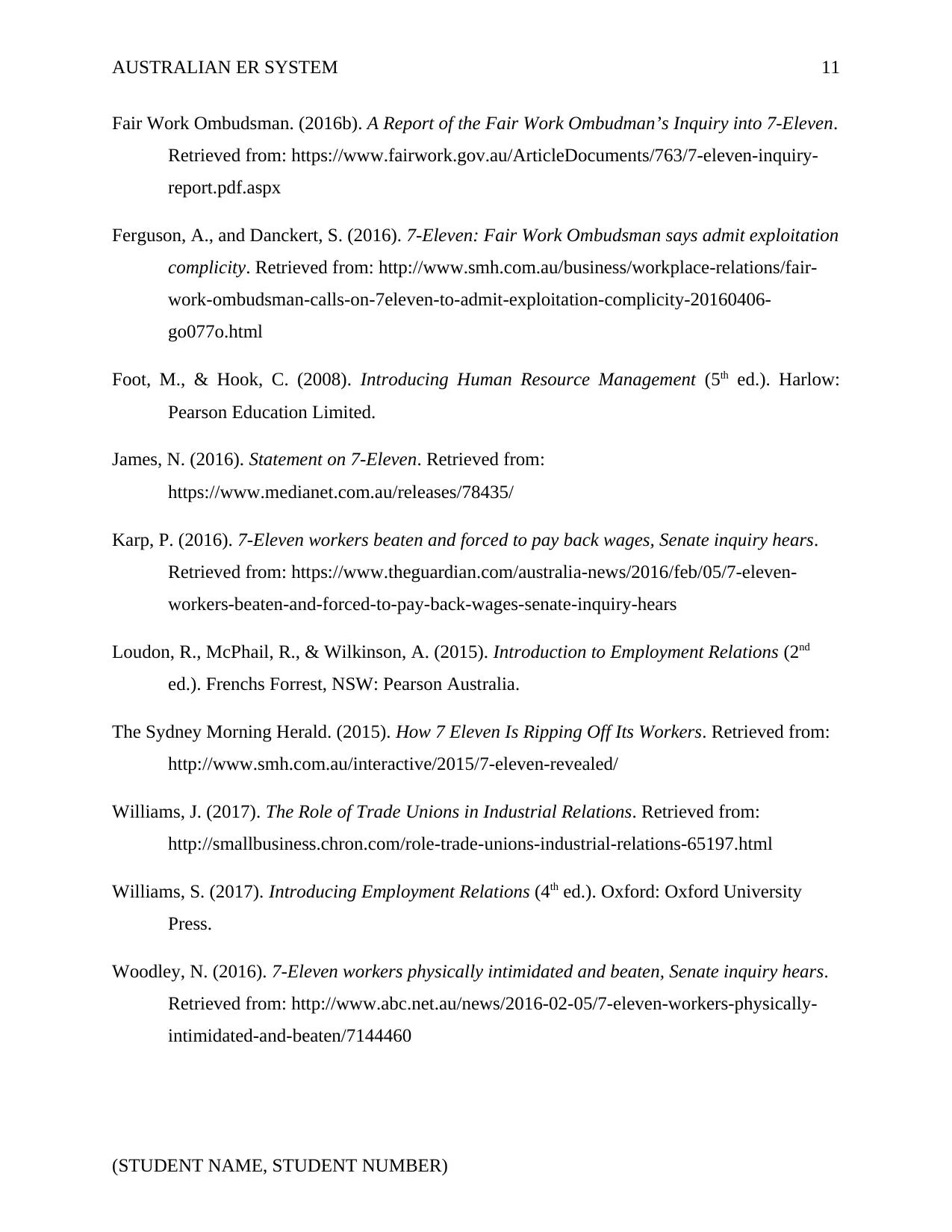
AUSTRALIAN ER SYSTEM 11
Fair Work Ombudsman. (2016b). A Report of the Fair Work Ombudman’s Inquiry into 7-Eleven.
Retrieved from: https://www.fairwork.gov.au/ArticleDocuments/763/7-eleven-inquiry-
report.pdf.aspx
Ferguson, A., and Danckert, S. (2016). 7-Eleven: Fair Work Ombudsman says admit exploitation
complicity. Retrieved from: http://www.smh.com.au/business/workplace-relations/fair-
work-ombudsman-calls-on-7eleven-to-admit-exploitation-complicity-20160406-
go077o.html
Foot, M., & Hook, C. (2008). Introducing Human Resource Management (5th ed.). Harlow:
Pearson Education Limited.
James, N. (2016). Statement on 7-Eleven. Retrieved from:
https://www.medianet.com.au/releases/78435/
Karp, P. (2016). 7-Eleven workers beaten and forced to pay back wages, Senate inquiry hears.
Retrieved from: https://www.theguardian.com/australia-news/2016/feb/05/7-eleven-
workers-beaten-and-forced-to-pay-back-wages-senate-inquiry-hears
Loudon, R., McPhail, R., & Wilkinson, A. (2015). Introduction to Employment Relations (2nd
ed.). Frenchs Forrest, NSW: Pearson Australia.
The Sydney Morning Herald. (2015). How 7 Eleven Is Ripping Off Its Workers. Retrieved from:
http://www.smh.com.au/interactive/2015/7-eleven-revealed/
Williams, J. (2017). The Role of Trade Unions in Industrial Relations. Retrieved from:
http://smallbusiness.chron.com/role-trade-unions-industrial-relations-65197.html
Williams, S. (2017). Introducing Employment Relations (4th ed.). Oxford: Oxford University
Press.
Woodley, N. (2016). 7-Eleven workers physically intimidated and beaten, Senate inquiry hears.
Retrieved from: http://www.abc.net.au/news/2016-02-05/7-eleven-workers-physically-
intimidated-and-beaten/7144460
(STUDENT NAME, STUDENT NUMBER)
Fair Work Ombudsman. (2016b). A Report of the Fair Work Ombudman’s Inquiry into 7-Eleven.
Retrieved from: https://www.fairwork.gov.au/ArticleDocuments/763/7-eleven-inquiry-
report.pdf.aspx
Ferguson, A., and Danckert, S. (2016). 7-Eleven: Fair Work Ombudsman says admit exploitation
complicity. Retrieved from: http://www.smh.com.au/business/workplace-relations/fair-
work-ombudsman-calls-on-7eleven-to-admit-exploitation-complicity-20160406-
go077o.html
Foot, M., & Hook, C. (2008). Introducing Human Resource Management (5th ed.). Harlow:
Pearson Education Limited.
James, N. (2016). Statement on 7-Eleven. Retrieved from:
https://www.medianet.com.au/releases/78435/
Karp, P. (2016). 7-Eleven workers beaten and forced to pay back wages, Senate inquiry hears.
Retrieved from: https://www.theguardian.com/australia-news/2016/feb/05/7-eleven-
workers-beaten-and-forced-to-pay-back-wages-senate-inquiry-hears
Loudon, R., McPhail, R., & Wilkinson, A. (2015). Introduction to Employment Relations (2nd
ed.). Frenchs Forrest, NSW: Pearson Australia.
The Sydney Morning Herald. (2015). How 7 Eleven Is Ripping Off Its Workers. Retrieved from:
http://www.smh.com.au/interactive/2015/7-eleven-revealed/
Williams, J. (2017). The Role of Trade Unions in Industrial Relations. Retrieved from:
http://smallbusiness.chron.com/role-trade-unions-industrial-relations-65197.html
Williams, S. (2017). Introducing Employment Relations (4th ed.). Oxford: Oxford University
Press.
Woodley, N. (2016). 7-Eleven workers physically intimidated and beaten, Senate inquiry hears.
Retrieved from: http://www.abc.net.au/news/2016-02-05/7-eleven-workers-physically-
intimidated-and-beaten/7144460
(STUDENT NAME, STUDENT NUMBER)
1 out of 11
Related Documents
Your All-in-One AI-Powered Toolkit for Academic Success.
+13062052269
info@desklib.com
Available 24*7 on WhatsApp / Email
![[object Object]](/_next/static/media/star-bottom.7253800d.svg)
Unlock your academic potential
Copyright © 2020–2026 A2Z Services. All Rights Reserved. Developed and managed by ZUCOL.





